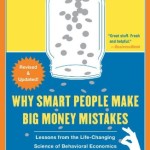One of the challenges of trying to teach and write about finance is figuring out the right balance between factual/rational information and psychological/irrational awareness.
We can all “know” the right ten things to do with our money, or we can all learn five correct financial math techniques as much as the next person – but money topics are so darned psychological that the math and rules and facts only get us so far.
Without some kind of intervention, or a very unusual upbringing, we’ll probably just continue our irrational path and unhelpful decisions anyway.
Gary Belsky – a finance writer – and Thomas Gilovich – a psychology professor – teamed up to write the translational text Why Smart People Make Big Money Mistakes and How To Correct Them to teach us the most common psychological or irrational choices we all make about money, all the time. I say translational because this book is really a popularization, or translation, of behavioral economics, pioneered by Nobel Prize-winning Daniel Kahneman and the late Amos Tvorsky.
Quick aside on the history of economics: Traditional mainstream economics posits that people are rational, that we make self-interested utility-maximizing decisions, and we can understand society and the allocation of resources based on that beginning assumption.
Now, if this assumption of mainstream economics were actually true in all cases, the task of teaching personal finance would be made so much easier. We could just tell people:
1. Here are the facts
2. Here is your self-interest
3. Now go forth and become a rational, wealthy, person.
Since most people are not wealthy, I’m going to go ahead and make the bold statement that the assumption of rational self-interest needs some tweaking.[1] And Kahneman and Tvorsky pioneered some of the most impressive tweaking in 1960s, which pioneering work became known as behavioral economics. It turns out most of us inject quite a bit of irrationality into our personal finance decisions, which partly explains why so few people are wealthy, or as wealthy as they ought to be.
Belsky and Gilovich’s excellent book translates this research into memorable anecdotes and examples and applies it to some of the most common financial mistakes we all make. Their theory, which seems extremely plausible to me, is that understanding the irrational choices we often make, and why we make them, will help us make better choices in the future.
Ubiquity of Overconfidence
Most of us tend to overestimate what we know and underestimate our ignorance of what we don’t know. I appreciated Belsky and Gilovich’s following test:
Name a high and low range for
a) The diameter of the moon in miles and
b) The weight of an empty Boeing 747 in pounds. Set the range so that you are 90% confident that the correct answer will be within your high and low range.
This seemed pretty easy to me. And I recommend you think of your range before checking the answer in the footnote.[2] Just do it now, I’ll wait….
Ok.
So I did this and I got it wrong. Maybe you did too. Belsky and Gilovich say most people do get it wrong, even though most people could set an extraordinarily wide range and get it “right.” Their point is that for topics about which we’re really not experts, we tend to be overconfident with our answers. The idea here, applied to investing, is that we all tend to think we know more than we actually know.
In a related story, have you noticed a lot of complete amateurs who buy individual stocks? (Yes, I’m looking at you. And me.)
How about my own related story? Back in the Spring of 2001 I was selling bonds for Goldman Sachs and I was quite a sophistical investor, let me tell you. I bought and sold securities for a living, had minute-by-minute access to financial data, and smart finance professionals all around me with whom I constantly exchanged investment ideas.
I had my eye on an amazing stock for an amazingly profitable company and I had some pretty good information about it. I spent quite a bit of time on my Bloomberg terminal (all that Street research at my fingertips!) researching their strongest points. Although they ran a traditional oil and gas pipeline network business, they were known to employ some of the smartest guys on the planet, including an internal emerging markets bond hedge fund that was a client of mine. I knew these guys personally. After visiting my clients at this company in Houston, I came away so impressed that I vowed to myself I would invest my next big bonus in their stock.
Fortunately for me, Enron imploded in the Fall of 2001 before I got paid.
The lesson: I know nothing.[3]
And neither do you! This is good to remember.

Anchoring Effect of Numbers
We are all extremely susceptible to the power of suggestion, when it comes to finance, through the ‘anchoring effect’ of numbers.
When the rug salesman shows us a fine carpet and names his offering price, we naturally know that it’s a bit high. We adjust some percent discount that seems like a ‘tough’ negotiating position, say 40% less. We then eventually find a middle ground with the salesman around 80% of the original offered price. We feel clever for driving that hard bargain to produce 20% savings. The rug salesman feels happy because, in fact, he started the price at 10 times above his bottom line price. What did we know?
When my student in the Personal Finance class I teach this semester mentions that Best Buy stocks are suddenly down 27% on the day, and asks me if he should buy some for a trade, as happened to me a few weeks ago, all I can think is I should tell him about:
1. The ubiquity of overconfidence, combined with
2. The anchoring effect of the previous days’ Best Buy price.
In reality, he has no idea whether Best Buy is fairly valued today, yesterday, or three weeks ago. Nor do I. But it seems cheap. So did the rug.
Money Illusion – Nominal v. Real
This one happens all the time. Belsky and Gilovich provide a nice example, which I’ve paraphrased below.
Three different homeowners experience price changes on their homes purchased for $200,000 in different ways, in the year before they sell it.
For the first homeowner, Peter, one year of intense inflation raises the price of all assets in his country, by 25%. He manages to sell his house at an appreciated price of 23%, netting him $246,000 at the end of the year.
For the second homeowner, Paul, at the end of a year of unchanged prices (no inflation) in the economy he sells his house for the same amount, and nets $200,000.
Mary, the third homeowner, experiences a rapid deflation of prices by 25% in the economy, and sells her house for a 23% loss, netting $154,000.
Who is better and worse off?
Now you may be clever enough to know that Mary is the best-off of the three, as the purchasing power of her $154,000 is higher than the purchasing power of Peter’s $246,000.
On the other hand, in the real world, it’s extremely challenging for all of us to remain immune to the illusions of real versus nominal dollar values.
Mental Accounting
As psychologically complicated beings, we create different ‘mental buckets’ for certain pockets of money.
This pushes us off the rational financial path in a variety of dramatic ways.
Most of us have a difficult time saving money because we experience the removal of that money from our ‘spending bucket’ as a painful loss.
When we can manage to set up an automatic payroll deduction into a savings account or 401K retirement plan, by contrast, we never have the chance to feel that loss. The act of accumulating savings goes from being extremely hard to do to being simple and unnoticed, a mental jedi-mind trick that for many is the key to having a savings plan.

Loss Aversion
Belsky and Gilovich point out that we tend to experience the pain of financial losses more dramatically than the pleasure of financial gains. This inequality of reaction leads us to be more ‘loss-averse’ in our investment choices than we should otherwise be, in a purely rational world. In other words, if we were not plagued by our loss aversion, many more of us would have a much greater portion of our investment portfolios in risky assets – such as stocks – rather than non-risky assets – such as bonds – as I’ve argued, from a purely rational standpoint, before.
It doesn’t make sense for your wallet or your rational self, but we act with our irrational instincts much of the time.
Belsky and Gilovich present a great deal more examples of ways in which we all fall prey to illogical, irrational, thoughts and actions when it comes to finance. I highly recommend their excellent translation of Nobel Prize-winning research into actionable steps for improving our personal financial situations.
Please see related post All Bankers Anonymous book reviews in one place
[1] No, nobody said anything about twerking. Now get your irrational mind out of the gutter.
[2] Moon diameter: 2,160 miles. I guessed a range of 4,000 to 40,000 miles. Oof. Empty Boeing 747 weight: 390,000 pounds. I guessed a range of 10 to 100 tons, or 20,000 to 200,000 pounds. Oof again. What did you guess?
[3] Or as Ygrette would say: “You know nothing, Jon Snow.”
Post read (6564) times.







3 Replies to “Book Review: Why Smart People Make Big Money Mistakes”
“Nominal v. Real” – Very helpful food for thought.
apparently the empty weight of 747 is not 390,000 … it is ~129,000 according to http://simviation.com//rinfo747.htm
btw by intentionally going for the “90% chance of sucess” advice, I got luckier than you this time.
I guessed 100-2000 miles for the moon (huge low-high, I admit) and 20-200 tons for the empty 747 (again, huge but valid)
nice job!